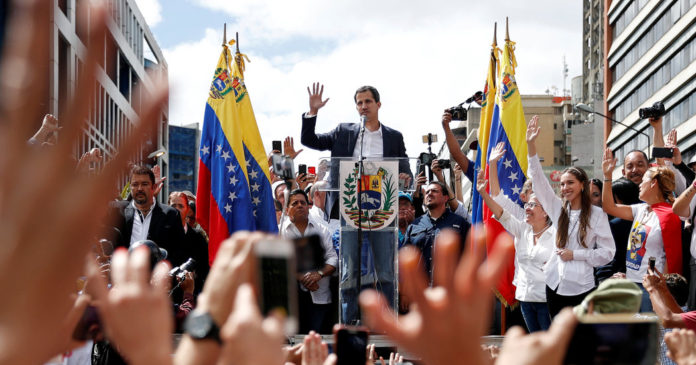Good morning.
President Emmanuel Macron of France debates rural mayors, President Nicolás Maduro of Venezuela cuts ties with the U.S., and science institutions combat rogue gene editing of human embryos. Here’s the latest:
Can Macron talk his way out of a crisis?
After weeks of stunned retreat following the Yellow Vest protests, the French president is clawing back public support with a touring series of town-hall-style meetings.
Details: Mr. Macron met with 600 mayors in southwestern France last week, where he spoke for hours — without notes — on the minute details of everything from medical aid to state public housing expenditures.
But some were left wanting: Mr. Macron didn’t back down from his pro-business, pro-capital stance, the genesis of the Yellow Vest movement.
Analysis: Our Paris correspondent writes that early indications suggest the president may finally be turning a corner: Opinion polls are slightly on the rise, violence is declining and his party is overtaking the far right in surveys for the European elections in May.
Maduro cuts U.S. diplomatic ties following opposition
The opposition leader, Juan Guaidó, declared himself Venezuela’s president as tens of thousands gathered in anti-government protests — the most direct challenge yet to President Nicolás Maduro.
President Trump — along with Canada, Brazil, Colombia, Paraguay and others — quickly recognized Mr. Guaidó as the country’s interim president. In response, Mr. Maduro cut diplomatic ties with the U.S. and gave American diplomats 72 hours to leave Venezuela, accusing the Trump administration of plotting to overthrow him.
Background: Mr. Maduro’s presidency is teetering after his disputed re-election last year. Under his leadership, the country’s economy has spiraled downward, with hyperinflation reaching one million percent, and food, water and medicine supplies running low.
What’s next? Unclear. The opposition was hoping that a significant turnout for demonstrations would persuade the military to break ranks with the president, and the U.S. and many of Venezuela’s neighbors have signaled strong support for a plan to establish a transitional government. But the challenge to Mr. Maduro’s authority could well lead to violent confrontations, chaos and confusion.
Details: Mr. Ghosn’s arrest in Japan on charges of financial misconduct has created a deep divide between Renault and Nissan, where he was also chairman. The push for the leadership change came from the French government, Renault’s largest shareholder, in a bid to save its alliance with the Japanese company — the dominant performer in the partnership. Mr. Ghosn has offered to resign from his positions.
One of the French automaker’s greatest concerns is that Nissan may seek to rebalance the current shareholding structure: Renault owns a 43 percent stake in Nissan, while Nissan holds 15 percent in Renault with no voting rights.
In an unusual move, French government officials flew to Tokyo to meet with Japanese officials and Nissan stakeholders last week to try to smooth relations.
What’s next? Renault’s nomination committee is expected to recommend Jean-Dominique Senard, chief executive of the French tire maker Michelin, as the new chairman of the board, and Thierry Bolloré of Renault as the new chief executive.
Trying to stop gene editing of human embryos
Following a Chinese researcher’s announcement that he had created the first genetically edited babies, scientists are trying to devise global safeguards to prevent further rogue experimentation.
Background: The scientist He Jiankui shocked the scientific community in November when he revealed that he had created pregnancies using genetically edited human embryos. One of them resulted in twins.
Some U.S. researchers knew about his project, but they said they weren’t able to stop him. Although scientists differ on the best approach for implementing policies that would keep such experiments from happening again, they do agree they should act quickly.
What’s at stake: Scientists fear that genetically edited babies could develop unintended health problems that could be inherited by subsequent generations. They also worry about attempts to produce designer babies, genetically altered for physical features, intelligence or athletic prowess.
What’s next: The World Economic Forum in Davos, Switzerland, is set to discuss the issue today.
Here’s what else is happening
Davos: World leaders from Japan, China, Germany and South Africa announced a greater need for global oversight of the tech sector at the World Economic Forum in Davos, Switzerland, although there was no consensus for what such a system might look like.
U. S. shutdown: House Democratic leaders said they were prepared to offer President Trump $5.7 billion for border security — but not for a wall, and not until he agreed to end the government shutdown. Separately, Mr. Trump said he would deliver the State of the Union address after the federal government reopens, following a tit-for-tat with House Speaker Nancy Pelosi.”
Russia: Officials put a new cruise missile on display for a foreign audience for the first time, in an attempt to rebut American accusations that the weapon violates a key nuclear arms accord. But the U.S. argued that inspecting a stationary missile would not prove compliance.
Madrid: Taxi drivers who have been protesting Uber and other ride-hailing companies in the Spanish capital clashed with police officers, leaving many injured. Their strike efforts further intensified after their counterparts in Barcelona won concessions that could force Uber to suspend service.
Australian Open: French tennis player Lucas Pouille, who came to Melbourne severely overlooked, will face Novak Djokovic in his first Grand Slam semifinal while Rafael Nadal plays Stefanos Tsitsipas of Greece. Here’s all our coverage from Melbourne.
Cambodia: An “officially amazing” 8,900-pound sticky-rice cake, the world’s longest scarf, the world’s longest dragon boat: These oddball Guinness World Record achievements are part of Prime Minister Hun Sen’s push to get young people excited about his aging regime.
Smarter Living
Tips for a more fulfilling life.
As the oldest and largest book fair in the Middle East, it usually attracts at least a million visitors. Many simply want to snap up popular books at discounted prices.
This year’s fair is just opening. It features 748 publishers from 35 countries. “I know kids who save up to buy bags’ worth of books,” said the Egyptian author Ahdaf Soueif.
But the organizers have been blasted for moving the fair from the city center to a cavernous convention center in the suburbs. Some Egyptians say they can’t afford to reach the new site.
Booksellers from a famous secondhand market in central Cairo are boycotting the event. They’ve come up with their own solution — a rival book fair.
Declan Walsh, our Cairo bureau chief, wrote today’s Back Story.
Your Morning Briefing is published weekday mornings.
Check out this page to find a Morning Briefing for your region. (In addition to our European edition, we have Australian, Asian and U.S. editions.)
Sign up here to receive an Evening Briefing on U.S. weeknights, and here’s our full range of free newsletters.
What would you like to see here? Contact us at europebriefing@nytimes.com.
Source : Nytimes














